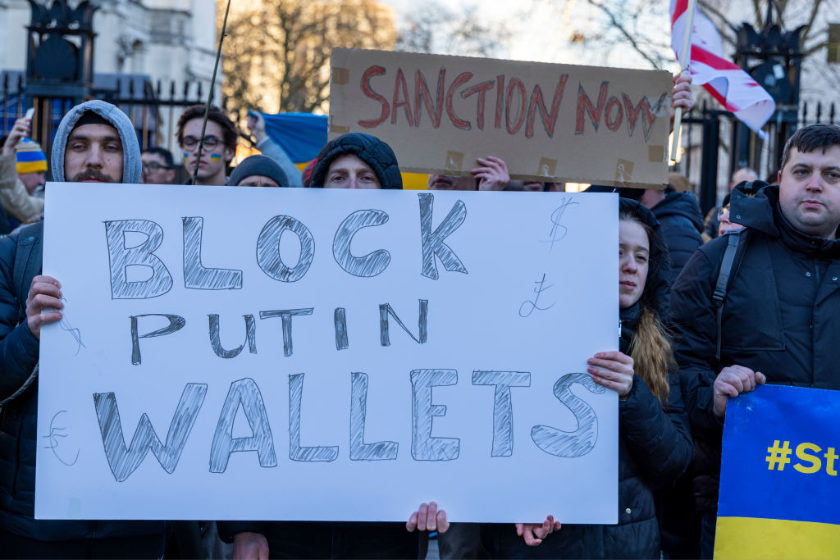How to ace a compliance review
We spoke with IFA Director of Professional Standards Tim Pinkney about how firms can best prepare for compliance...
READ MORE
Accountants must be satisfied their clients are not subject to sanctions or transacting with those who are. Here, how to assess risk, what to do if suspicions arise and a global map of the individuals and entities subject to sanctions.

Demonstrators in London call for tougher financial sanctions against Putin and the Russian government in February 2022.
The UK imposes financial sanctions via regulations and legislation, as well as implementing sanctions as required by UN Security Council resolutions. Financial sanctions limit access to financial services, markets and funds, as well as to economic resources.
The Office of Financial Sanctions Implementation (OFSI), part of HM Treasury, lists four goals of sanctions:
Accounting firms and accountants must report all breaches of sanctions, or suspected breaches, to OFSI. They must also report any suspicion that they are dealing with an individual or entity that is subject to sanctions.
And it is the responsibility of the accounting firm or individual to consider the risk their clients are on sanctions lists as part of a firm-wide AML risk assessment, to include sanctions lists in customer due diligence (CDD), and to record the processes and procedures they follow in these risk assessments and CDD.
Any firm or accountant that suspects a client may be subject to sanctions can download the Foreign, Commonwealth and Development Office UK sanctions list or, for specific financial sanctions, the OFSI consolidated list of financial sanctions targets in the UK and check whether their client is listed.
These files are available in various formats and a simple search may suffice to check a low-risk client.
Based on OFSI’s ‘Consolidated List’, this map shows the number of individuals and entities subject to sanctions in each country. Hover/click to display the number of individuals and entities in each country. Note that many entries on the list do not include a country.
However, IFA Director of Professional Standards Tim Pinkney suggests a measure of professional scepticism.
“Accountants can suffer if they are found not to have conducted their due diligence and checked sanctions lists when warranted,” he says. “If your due diligence throws up a surprising piece of information, be suspicious, check the sanctions lists and, if you are not satisfied, report to OFSI and consider submitting a Suspicious Activity Report (SAR).”
Some firms may be equipped to act on behalf of clients who are on sanctions lists or trading with individuals or entities subject to sanctions – those firms can apply to OFSI for a licence. In the meantime though, they must suspend transactions.
Other firms may be best served by disengaging with the client – if this is the case, send a letter notifying the client and keep a record of the disengagement.
Concerns about a client being subject to sanctions, or trading with an individual or entity subject to sanctions, are not necessarily subject to ‘tipping off’ laws that would apply in the case of a SAR. Unless there are other restrictions, based on the Money Laundering Regulations, there is no legal reason to prevent you speaking openly with your client about your concerns.
Pinkney offers guidance on what to look for when assessing a client’s risk profile:
Find out more in IFA’s Technical Resources, or register for the IFA AML Conference Online, which will be held on 21 May 2024.